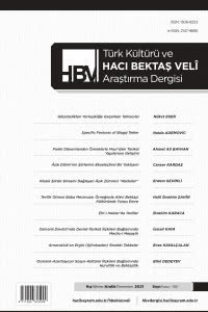Modern ve Seküler Felsefenin Tasavvuf ve Zorlukları: Nasr’ın Bakış Açısı
SUFISM AND CHALLENGES OF MODERN AND SECULAR PHILOSOPHY: NASR’S PERSPECTIVE
___
- Asghari, SeyedAmirHossein. (2017). Ontology and Cosmology of the ʿaql in Ṣadrā’s Commentary on Uṣūl al-Kāfī. Journal of Shi’a Islamic Studies 10/2, 157- 182.
- Asghari, SeyedAmirHossein. (2020). Intellect and Revelation- Notes on Mullā Ṣadrā S̲h̲īrāzī’s Approach in His Commentary on Usul Al-Kafi. DOI: 10.2139/ssrn.3756647
- Asghari, SeyedAmirHossein. (2020). “Shiʻa Mystical Theology: Notes on Sayyid Ḥ Aydar Āmulīʼs Jāmiʻ AlAsrār Wa Manbaʻ Al-Anwār.” Kom Casopis Za Religijske Nauke 9/3: 65-80.
- Baharlu, İlgar. (2020). Şah’ın Bahçesinde Şah İsmail Öncesi ve Sonrası Kızılbaşlık. İstanbul: Kitabevi Yayınları.
- Chittick, William. C. (2007). Science of the Cosmos, Science of the Soul: The Pertinence of Islamic Cosmology in the Modern World. Oxford: Oneworld.
- Chittick, William. C. (2012). The Goal of Islamic Education. In J. Casewit (Ed.), Education in the Light of Tradition. Bloomington, Ind.; London: World Wisdom; Deep [distributor].
- Deane-Drummond, Celia. (2017). Pierre Teilhard de Chardin on people and planet. Retrieved from https://search.ebscohost.com/login. aspx?direct=true&scope=site&db=nlebk&db=nlabk&AN=1550699
- Descartes, René., Cottingham, J., & Williams, B. (2017). Meditations on First Philosophy: with Selections from the Objections and Replies (Second Edition. ed.). Cambridge, United Kingdom; New York: Cambridge University Press.
- Descartes, René., Cottingham, J., & Williams, B. and Maclean, Ian. (2006). A Discourse on The Method of Correctly Conducting One’s Reason and Seeking Truth İn The Sciences. New York: Oxford University Press.
- Fernando, Ranjit.(1999). The Unanimous Tradition: Essays on The Essential Unity of All Religions. Colombo: Sri Lanka Institute of Traditional Studies.
- Guénon, René. (1946). La Crise Du Monde Moderne. Paris: Gallimard.
- Guénon, René. (1987). Orient et Occident. Paris: Éd. de la Maisnie.
- Guénon, René. (2001). The Crisis of The Modern World. Ghent, NY: Sophia Perennis.
- Guénon, René. & Herlihy, John. (2009). The Essential René Guénon: Metaphysics, Tradition, And The Crisis of Modernity. Bloomington, Ind.San Rafael, Calif.: World Wisdom; Sophia Perennis.
- Kalin, Ibrahim. (2001). The Sacred versus the Secular: Nasr on Science. In R. E. Auxier, L. E. Hahn, and L. W. Stone (Eds.), The philosophy of Seyyed Hossein Nasr (Vol. 28). Chicago: Open Court.
- Legenhausen, Muhammad. (2002). Why I Am Not a Traditionalist. Retrieved from https://english.religion.info/wp-content/uploads/2016/08/2002_legenhausen. pdf
- Mehta, Neeta. (2011). Mind-body Dualism: A critique from a Health Perspective. Mens sana monographs 9/1, 202-209.
- Melvin-Kushki, Matthew. (2017). Powers of One: The Mathematicalization of the Occult Sciences in the High Persianate Tradition. Intellectual History of the Islamicate World 5/1, 127-199.
- Melvin-Kushki, Matthew. (2019). How to Rule the World: Occult-Scientific Manuals of the Early Modern Persian Cosmopolis. Journal of Persianate Studies 11/2, 140-154.
- Melvin-Kushki, Matthew. (2020). Is (Islamic) Occult Science Science? Theology and Science 18/2, 303- 324.
- Mulla Sadra, S. (2001-5). Al-Hikma al-muta‘aliya fi-l-as far al-‘aqliyya al-arba‘a [The Transcendent Philosophy of the Four Journeys of the Intellect] (Vol. 5). Tehran: Bunyād-i Sadra.
- Nasr, Seyed Hossein. (1968a). The Encounter of Man and Nature: The Spiritual Crisis of Modern Man. London: Allen & Unwin.
- Nasr, Seyed Hossein. (1968b). Science and Civilization in Islam. Cambridge: Harvard University Press.
- Nasr, Seyed Hossein. (1983). Reflections on Islam and Modern Thought. Studies in Comparative Religion 15(3&4). Retrieved from www.studiesincomparativereligion.com
- Nasr, Seyed Hossein. (1989). Knowledge and the Sacred. Albany: State University of New York Press.
- Nasr, Seyed Hossein. (1996). Religion and the Order of Nature. New York: Oxford University Press.
- Nasr, Seyed Hossein. (2006). In the Beginning, was Consciousness. Retrieved from http://www. worldwisdom.com/public/viewpdf/default.aspx?article-title=In_the_ Beginning_was_Consciousness_by_Seyyed_Hossein_Nasr.pdf. Retrieved 06/28/2010, from World Wisdom http://www.worldwisdom.com/public/ viewpdf/default.aspx?article-title=In_the_Beginning_was_Consciousness_ by_Seyyed_Hossein_Nasr.pdf
- Nasr, Seyed Hossein and Iqbal, Muzaffar. (2007). Islam, Science, Muslims, and Technology. Kuala Lumpur. Sherwood Park, Alberta, Canada: Islamic Book Trust; Al-Qalam Pub.
- Nasr, Seyed Hossein, Sivin, N., and Smith, H. (1973, 1973). Contemporary Man: Between The Rim and the Axis. Paper presented at the Technology and Culture Seminar, [Cambridge, Mass.].
- Rizvi, Sajjad. (2019). “Mulla Sadra. In Edward. N. Zalta (Ed.), The Stanford Encyclopedia of Philosophy (Spring 2019 Edition): Stanford University. Sari, Emre. (2016). Asiklarimiz. Antalya, Turkey: Nokta E-Kitap.
- Seattle, Chief. (1854). Chief Seattle’s Letter To All. Retrieved from http://www.csun. edu/~vcpsy00h/seattle.htm
- Sideris, Lisa. H. (2018). Consecrating Science: Wonder, Knowledge, And The Natural World. Oakland, California: University of California Press.
- Smith, Huston. (2001). Nasr’s Defense Of The Perennial Philosophy. In Randall. E. Auxier & Lucian. Stone (Eds.), The philosophy of Seyyed Hossein Nasr. Chicago: Open Court.
- Spicker, Stuart. F. (1994). The Philosophy of the Body: Rejections of Cartesian Dualism. Malabar, Fla: Krieger Pub. Co.
- ISSN: 1306-8253
- Yayın Aralığı: 4
- Başlangıç: 1994
- Yayıncı: Ankara Hacı Bayram Veli Üniversitesi Türk Kültürü Açısından Hacı Bektaş-ı Veli Araştırmaları Uygulama ve Araştırma Merkezi
Modern ve Seküler Felsefenin Tasavvuf ve Zorlukları: Nasr’ın Bakış Açısı
ALEVİLİKTE OCAK GELENEĞİ ve ALİ BİRCİVAN OCAĞI
Sufi gelenekte KEŞKÜL-Ü FUKARA KÜLTÜRÜ VE SERAMİK KEŞKÜLLER ÜZERİNE İKONOGRAFİK BİR DEĞERLENDİRME
HACI BEKTAŞ VELİ’NİN ÖLÜM TARİHİ HAKKINDA
Sovyetler Döneminde Sufiliğin Rejime Karşı Direnişinin İncelenmesi (1922-1991)
Turganbai ABDRASSILOV, Zhakhangir NURMATOV, Kainar KALDYBAY
MİLLİ KÜTÜPHANE’DE “06 MİL YZ 4573-1” NUMARASI İLE KAYITLI MECMUA VE MUHTEVASI
GAZİANTEP ÇEPNİLERİNİN ZİYARET MEKÂNLARI: HACI KOREŞ VE SEYDİ KOREŞ ZİYARET RİTÜELİ VE UYGULAMALARI
